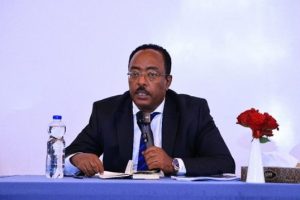
Ethiopia has already launched a three-year macroeconomic reform project in collaboration with the United States Agency for International Development (USAID) to sustain its rapid economic growth and to tackle challenges confronting the ongoing reform.
The project known as ‘‘Advancing Economic Diversification in Ethiopia,’’ was announced on 23August 2019 by National Bank of Ethiopia (NBE) Governor Dr. Yinager Dessie and US Ambassador to Ethiopia, Michael Raynor.
Dr. Yinager said on the occasion that the project aims at sustaining the rapid economic growth, creating job opportunities and stabilizing the macroeconomic situation of the country.
‘‘Our country has been facing challenges of forex shortage, devaluation of Birr, debt burden, inflation and unemployment. This project would address such problems and it will create macroeconomic stabilization,’’ he noted.
Despite the double digit economic growth that has been registered in Ethiopia over the last two decades, there is still economic inequality, inflation, lack of proper resource management and unemployment, Economics Assistant Professor, at Mekelle University, Dawit Hailemariam says.
He adds that feasible macroeconomic reform is highly needed to revitalize the economy and to address the aforementioned problems. ‘‘Ethiopia has shown tremendous economic growth which was witnessed by the World Bank, IMF and other international organizations. Nevertheless, the growth wasn’t fair and inclusive.
The economy is still in the hands of very few people. That’s why citizens have been experiencing market manipulation and sabotage over consumer goods after the reform come into effect,’’ Dawit points out.
He underlines that the three-year economic project being designed will have pivotal role in creating jobs, alleviating market mismanagements and sustaining more stable and robust economy.
Ethiopia is ambitious of creating export-oriented- manufacturing-based economy by 2025. Dawit reaffirms that new project will have a huge role in realizing that ambition through motivating Foreign Direct Investment (FDI), boosting export trade and speeding up the manufacturing sector.
The government needs to create job opportunities for the hundreds of thousands of students who graduate every year from universities and colleges hence strengthening Micro and Small Business Enterprises (SMES) would be an ideal solution to create employment, according to the lecturer.
‘‘SMES have momentous role in lifting people out of abject poverty. Moreover, they could pave the way for catalyzing industrialization. Thus, the new project should prioritize absorbing the unemployed youths and empowering low-income livelihoods.’’
In addition to that, the macroeconomic reform must consider boosting agricultural produce and productivity since more than 80 percent of Ethiopians still depend on this sector for their livelihood.
For his part, Marketing Lecturer at Addis Ababa University School of Commerce, Fitsum Yemane says the macroeconomic reform being launched will butress the government’s plan towards liberalizing the economy.
As the government has decided to allow private investors (local and foreign) to invest in the major state-owned enterprises like telecom, airlines, electric power, shipping and logistics, the new project will have vital role in facilitating such ambitious liberalization process, he notes.
The other very important issue the lecturer raised is resource utilization through modern technology. As to him, the nation has been dependent on agricultural products for its export trade. ‘‘this old trend should be reversed so as to emerge competent in the global market,’’ Fitsum argues.
‘‘Ethiopia has high rate of debt. This has restrained the government from launching new mega projects because it needs to pay the debt first. So if we want to build resilient economy, we have to decrease loan and grant dependency. We have to develop industrialization to export value-added products. I hope the new macroeconomic reform will place focus on enhancing the manufacturing sector.’’
Moreover, Fitsum points out that the new macroeconomic reform could lure FDI more than any time ever as it espouses the full and partial privatization of the aforementioned profitable companies.
Hence, there will be massive capital, skill, knowledge and technology transfer when foreign companies engage in the major enterprise.
Indicating that inflationary build-up, external debt distress and unemployment are the key economic problems in Ethiopia, Fitsum recommends the macroeconomic reform has to address them.
‘‘The price in consumer goods is affecting low-income societies. Besides, there is high rate of unemployment in the country. Thus, the government should see to ways of supporting disadvantageous societies and empowering the youth,’’ he adds.
Ethiopia has been heavily investing on infrastructural development, power generation, sugar factories, industrialization and strengthening health and education sector over the last two decades.
However, since the economic growth was far from equitable and inclusive, the majority of the people were not beneficiaries. Having understood this limitation, the government has designed a three-year project to create robust, comprehensive and sustainable economy.
The Ethiopian Herald September 1/2019
BY TSEGAY HAGOS





